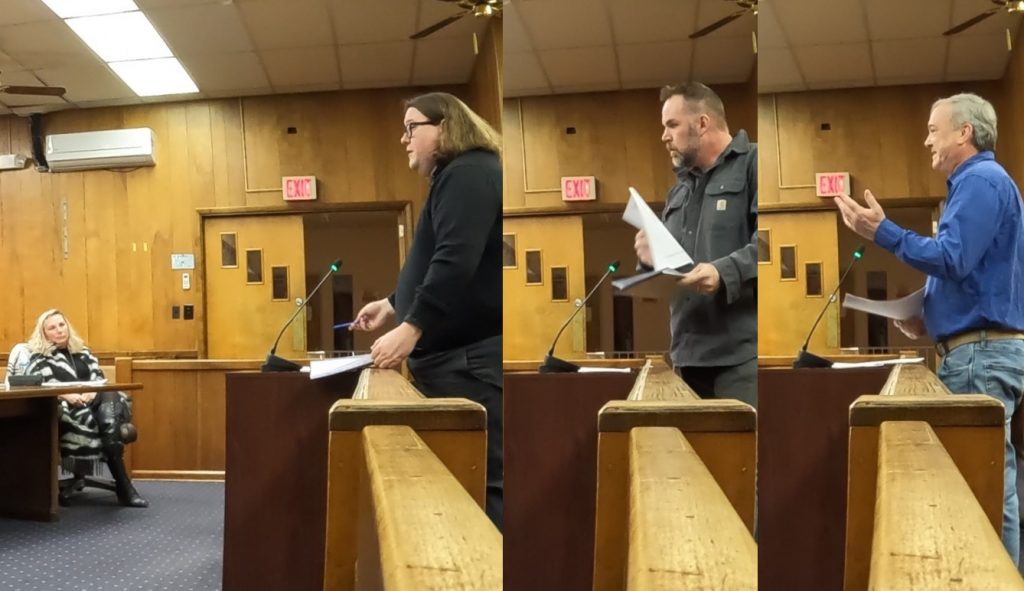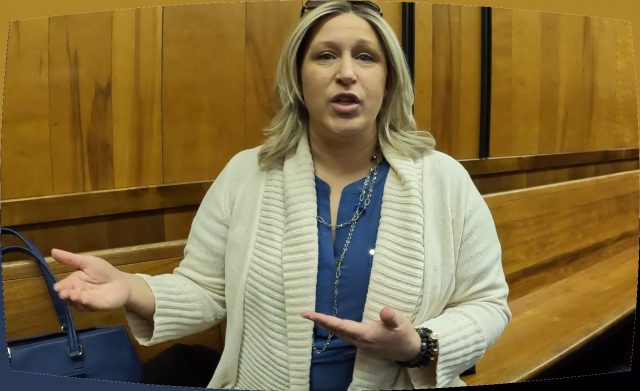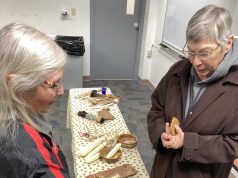
Chillicothe — Council finally got past the latest controversial topic, of a “cannabis moratorium,” by passing that ordinance on its delayed third and final reading. (Read about that in my previous story.) But that was only to return to the next controversial topic, “anti-camping” legislation, intended to control homeless camps.
While closing out her moratorium legislation, Community Affairs chair Lisa Bennett began discussion of her committee’s “anti-camping” legislation, a return to a topic from a couple years ago. She announced an upcoming committee meeting on it on January 27th.
From a letter on December 2nd by Chillicothe Law Director Anna Villarreal:
“Several months ago, Law Enforcement reached out to the Law Director’s Office concerning various complaints in reference to homeless camps near the floodwall and east of the Bridge Street Bridge. Law Enforcement indicated they had gone to the camps, offered resources, and warned the individuals in reference to Criminal Trespass and Littering only to have new subjects moving into the area.
“In response to this request for guidance, the issue was assigned to Law Director Office Assistant Hannah Bivens for research into possible solutions to the problem of camping in public areas…This is not a final draft of legislation but is a good starting point to address the challenges related to this sensitive issue. This legislation was drafted in light of a more recent ruling by the US Supreme Court…”
Welcome Stokien spoke on that topic in the public address section of the council session, giving a list of suggestions for compassion and comprehensiveness in treating the unhoused. She said she does not represent any advocacy group, but briefly experienced two kinds of homelessness years ago herself, and felt the need to do some research to help shape the discussion.
I recorded her address, as well as interviewed her about it; she also supplied written copies of her address, all of which you can see below. (Stokien ran for Ross County Commissioner on the Democratic ticket in 2024.)
A meeting of the Southern Ohio H.A.R.T. (Homeless Advocacy Response Team) – for “anyone you know who is concerned about the proposed Public Camping Ban before City Council” – was held at the Chillicothe Library Main Library two days before the council session, on January 11th.
You might also read my two recent stories on the Chillicothe homeless shelter, which has been operating 24/7 after opening little more than a year ago.

In the short half-hour first session of the year, Council seemed to spend more time receiving addresses from the public on various topics, than on conducting business. Hear them in their own words in the below video. (They can also be heard on council’s Youtube video of the session).
The Reverend Terry Williams, Lead Pastor of Orchard Hill United Church of Christ, returned to the lectern. (He is a periodic speaker to council, as well as watchdog / critic.)
He said he was reserving comments on the public camping legislation for the upcoming committee meeting, and praised the amount of communication on it so far.
Williams pointed out that the proposed legislation has been referred to as “public camping” in its documents, but in council it was referred to as “the homeless ordinance” – which creates a “targeted class” and thus may be an unconstitutional action.
Jason Link, the pastor of First Presbyterian Church who ran for Ross County Commissioner in 2024, addressed the proposed financial items on the agenda.
He said he was hoping to ask the auditor (who was absent) about the anticipated carryover in the city budget, in contrast to $120K of expenditures on agenda.
One of the items is a proposed resolution to put a 0.2% increase in city income tax on the spring ballot. He asked that with the healthy carryover, is it right to tax more?
In addition to urging passage of the cannabis moratorium, Doug McCord asked if the cannabis / THC “hit shops” are too close to the 13 for-profit recovery centers, and whether that very addictive situation needs to be regulated too.
John Thacker also asked about the progress of the proposed legislation on nonprofit organizations.
Stokien supplied an expanded version of her address:
Addressing public camping due to homelessness is a complex issue requiring compassion, coordination, and long-term strategies. Effective approaches balance the need to respect individual dignity with maintaining public health, safety, and order. Here are some best practices for cities dealing with public camping due to homelessness:
1. Provide Adequate Shelter Options
- Expand Shelter Capacity: Ensure there are enough shelters, transitional housing, or emergency beds to accommodate those experiencing homelessness.
- Low-Barrier Shelters: Create shelters that minimize entry requirements, such as sobriety or documentation, to attract more individuals who might avoid traditional shelters.
- Temporary Solutions: Offer sanctioned camping areas with sanitation facilities and security as an interim measure while permanent housing is developed.
2. Develop Permanent Supportive Housing
- Housing First Approach: Prioritize permanent housing as a fundamental solution. This evidence-based approach places people in stable housing before addressing other challenges, such as mental health or addiction.
- Affordable Housing Development: Increase the supply of affordable housing to prevent homelessness.
- Wraparound Services: Pair housing with support services, including mental health care, addiction treatment, job training, and case management.
3. Collaborate with Service Providers
- Partner with local non-profits, faith-based organizations, and healthcare providers to deliver services directly to those in need.
- Establish mobile outreach teams to connect individuals to housing and health services.
4. Enforce Compassionate Ordinances
- Balance Enforcement and Support: If public camping must be restricted, ensure that ordinances are implemented humanely and include outreach efforts.
- Encourage Voluntary Compliance: Provide campers with alternative shelter or housing options before enforcing camping bans.
- Avoid Criminalization: Focus on solutions that address root causes rather than penalizing homelessness, which can exacerbate the problem.
5. Improve Public Health and Safety
- Sanitation Facilities: Install portable toilets, handwashing stations, and trash receptacles in high-need areas to maintain public health.
- Regular Cleanups: Conduct regular cleanups of camps while offering secure storage for personal belongings to avoid confiscation disputes.
- Community Safety: Enhance security and lighting in affected areas to protect both housed and unhoused residents.
6. Invest in Prevention Programs
- Rental Assistance: Provide financial aid to prevent evictions and homelessness.
- Supportive Services: Offer employment support, legal aid, and counseling for at-risk populations.
- Youth and Family Programs: Focus on early intervention to prevent generational homelessness.
7. Engage the Community
- Educate Residents: Promote understanding of homelessness and reduce stigma through public education campaigns.
- Volunteer Opportunities: Encourage community involvement in homelessness initiatives, such as mentorship programs or meal services.
- Collaborative Planning: Include the voices of people experiencing homelessness in policy decisions to ensure solutions are practical and inclusive.
8. Secure Funding and Resources
- Federal and State Grants: Apply for funding to support housing and homelessness initiatives.
- Public-Private Partnerships: Work with businesses and philanthropists to expand resources and support innovative solutions.
9. Address Systemic Causes
- Healthcare Access: Expand access to mental health and substance abuse treatment programs.
- Economic Equity: Focus on wage growth, job opportunities, and affordable healthcare to address income inequality.
- Education and Training: Provide resources for skill-building and higher education to improve employability.
Examples of Successful Programs:
- Houston, TX: Implemented a coordinated system that reduced homelessness by 63% since 2011 through housing-first strategies and integrated services.
- Salt Lake City, UT: Reduced chronic homelessness by 91% with a focus on permanent supportive housing.
- San Diego, CA: Launched safe parking programs and bridge shelters with comprehensive services.
By focusing on a multi-pronged approach that combines immediate relief with long-term solutions, cities can address public camping and homelessness effectively while fostering a sense of dignity and community for all residents.











